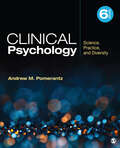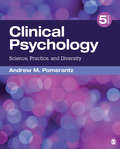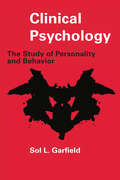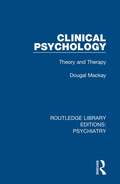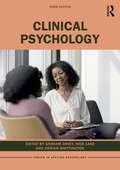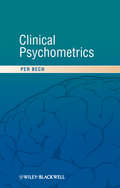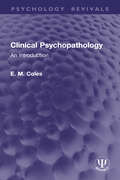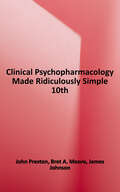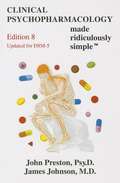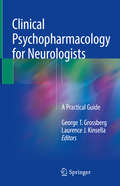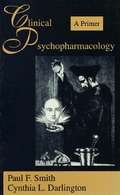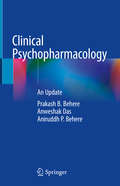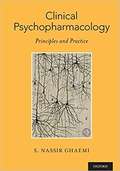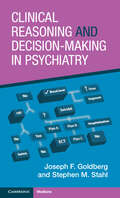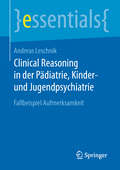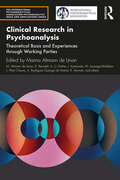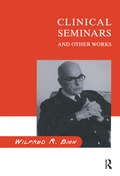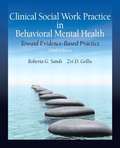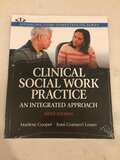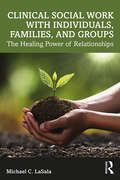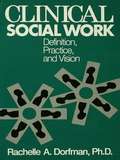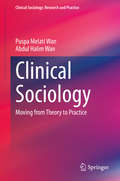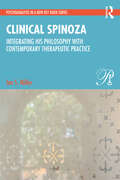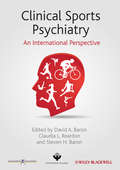- Table View
- List View
Clinical Psychology: Science, Practice, and Diversity
by Andrew M. PomerantzFrom award-winning author Andrew M. Pomerantz comes the Sixth Edition of Clinical Psychology: Science, Practice, and Diversity, providing students with an inclusive and culturally competent view of the vast world of clinical psychology. Through lively examples, robust scholarship, and a highly readable narrative, the author explores the key topics of clinical assessment, psychotherapy, and ethical and professional issues while also incorporating discussions of current controversies and specialized topics. With a career-focused feature and the latest research findings in the field, the new edition of this best-selling text is an essential resource for students in the classroom and beyond. This title is accompanied by a complete teaching and learning package. Contact your SAGE representative to request a demo. Learning Platform / Courseware SAGE Vantage is an intuitive learning platform that integrates quality SAGE textbook content with assignable multimedia activities and auto-graded assessments to drive student engagement and ensure accountability. Unparalleled in its ease of use and built for dynamic teaching and learning, Vantage offers customizable LMS integration and best-in-class support. It’s a learning platform you, and your students, will actually love. Learn more. Assignable Video with Assessment Assignable video (available in SAGE Vantage) is tied to learning objectives and curated exclusively for this text to bring concepts to life. Watch a sample video now. LMS Cartridge: Import this title’s instructor resources into your school’s learning management system (LMS) and save time. Don’t use an LMS? You can still access all of the same online resources for this title via the password-protected Instructor Resource Site. Learn more.
Clinical Psychology: Science, Practice, and Diversity
by Dr. Andrew M. PomerantzThe best-selling Clinical Psychology: Science, Practice, and Diversity presents an inclusive and culturally competent view of the vast world of clinical psychology. Through lively examples, robust scholarship, and a highly readable narrative, award-winning author Andrew M. Pomerantz explores the key topics of clinical assessment, psychotherapy, and ethical and professional issues while also incorporating discussions of current controversies and specialized topics. The Fifth Edition includes a new career-focused feature, original videos addressing ethical issues, and updates reflecting the latest research findings in the field.
Clinical Psychology: Science, Practice, and Diversity
by Dr. Andrew M. PomerantzThe best-selling Clinical Psychology: Science, Practice, and Diversity presents an inclusive and culturally competent view of the vast world of clinical psychology. Through lively examples, robust scholarship, and a highly readable narrative, award-winning author Andrew M. Pomerantz explores the key topics of clinical assessment, psychotherapy, and ethical and professional issues while also incorporating discussions of current controversies and specialized topics. The Fifth Edition includes a new career-focused feature, original videos addressing ethical issues, and updates reflecting the latest research findings in the field.
Clinical Psychology: The Study of Personality and Behavior
by Sol L. GarfieldInterest in clinical psychology has been growing as indicated by large numbers of undergraduates applying for admission to graduate programs and the professional degrees granted. This book is written for anyone with a strong interest in clinical psychology, but also provides a comprehensive and realistic view of the field.The book, therefore, can serve as a reference for courses in clinical psychology, but it will be relevant to courses in personality and personal counseling. Professional clinical psychologists and members of related professions may also find the book valuable because Garfield describes important historical developments that have helped to shape the field, the roles and functions of the clinical psychologist, their training programs, and contemporary issues and problems. The text also describes the theoretical models that guide the work of the clinical psychologist and upon which the divergent approaches to clinical work are based. Changes in the functions of the clinical psychologist are reflected in the greater emphasis on psychotherapeutic and behavior change methods and in the correspondingly reduced emphasis on diagnostic testing procedures--a development discernible in the decline in studies of high quality bearing on diagnostic issues.This book provides a reliable source of information for the individual who contemplates a professional career as a clinical psychologist and seeks to learn what the profession encompasses.
Clinical Psychology: Theory and Therapy (Routledge Library Editions: Psychiatry #15)
by Dougal MackayOriginally published in 1975, this book examines the various types of psychological disturbance, shows how they have come to be regarded as illnesses, and examines critically the notion of psychiatric diagnosis. It describes how clinical psychology has grown up within psychiatry to support a conceptual system antithetical to it. The author goes on to describe the theories and therapies that do not adhere particularly to the notion of mental illness. Today it can be enjoyed in its historical perspective.
Clinical Psychology: Topics In Applied Psychology (Topics in Applied Psychology)
by Graham DaveyClinical Psychology, Third Edition offers an introduction to clinical psychology as it is operating on the ground – delivering clinical interventions, supervision, consultation, leadership, training and research, in rapidly changing health and care services. This new edition of Clinical Psychology brings together practitioners, researchers, and people who have used the services of clinical psychologists to explain how clinical psychologists work, the evidence that their work is based on, and how it can change peoples’ lives for the better. The book explains the core principles of clinical practice, as well as outlining the role of a clinical psychologist within a healthcare team. It covers issues involved in working with children and families, adult mental health problems, people with disabilities and physical health issues, and the use of neuropsychology. In this fully revised third edition, every chapter has been brought up to date with developments in research and practice, and chapters have been added regarding the important fields of working with autistic people and working with people in forensic mental health services. Given the popularity of clinical psychology for many undergraduate and graduate students, the contents of this text have been designed around teaching and learning features that can be used as the basis for an intermediate or advanced-level course that will allow students to learn both breadth and depth about clinical psychology.
Clinical Psychometrics
by Per BechClinical Psychometrics is an introduction to the long-term attempt to measure the psychiatric dimension of dementia, schizophrenia, mania, depression, anxiety, neuroticism, extraversion/introversion and health-related quality of life. The two psychometric procedures, classical factor analysis and modern item-response models, are presented for readers without any requirement for particular mathematical or statistical knowledge. The book is unique in this attempt and provides helpful background information for the dimensional approach that is being used in the forthcoming updates to the diagnostic classification systems, ICD-11 and DSM-5. The book is written for everyone who is interested in the origins and development of modern psychiatry, and who wants to be familiar with its practical possibilities; how it is possible to compare different individuals with each other, how one may determine the boundary between what is normal and what is disease, or how one may assess the clinical effect of the various forms of treatment, available to present day psychiatry.
Clinical Psychopathology: An Introduction (Psychology Revivals)
by E. M. ColesPsychopathology is the scientific study of abnormal behaviour and mental illness, and thus forms part of the theoretical foundation for a great range of professions from special education, medicine and nursing, psychology and psychiatry to law enforcement and social work, all of which deal with people whose experiences or behaviour are in some way abnormal. Originally published in 1982 Clinical Psychopathology provided a broad introduction to the topics and problems of psychopathology, by taking the four major areas – classification and diagnosis, symptomatology, aetiology, therapy – summarizing their most important concepts and looking at the relationships between them. Professor Coles integrates the history of psychopathology with the main facts and theories that were current at the time, and an important feature of the book was that it maintained a balance between the approaches of the different disciplines that are involved in the subject.The bias of the book, writes Professor Coles, ‘is towards conceptualization and understanding of basic principles, particularly definitions, rather than a detailed recounting of specific disorders and treatments. It subscribes to the basic belief that psychology is the scientific study of common sense.’ His clear and lucid expositions would make the book particularly helpful to undergraduates and a source of useful information for all other readers. Today it can be read in its historical context.
Clinical Psychopharmacology Made Ridiculously Simple
by John Preston James Johnson Bret A. MooreThis new edition includes thoroughly revised and updated information on the latest medications and guidelines when treating psychological disorders. Includes new sections discussing Neurobiology and Cultural Influences on Psychopharmacology. A brief, practical review of the indications for and use of pharmacological agents in the treatment of psychological disorders. Successful medical treatment of emotional and mental disorders depends on two factors: 1. A thorough knowledge of psychotropic medications, and 2. An accurate diagnosis. Both issues are addressed in this book in a practical and concise format. Case examples. Chapter on over-the-counter medications and dietary supplements. Up-to-date DSM-5 classification of psychological disorders.
Clinical Psychopharmacology Made Ridiculously Simple (Eighth Edition)
by John Preston James JohnsonA brief, practical review of the indications for and use of pharmacological agents in the treatment of psychological disorders. Case examples. Chapter on over-the-counter medications and dietary supplements. Updated for DSM-5 classification of psychological disorders.
Clinical Psychopharmacology for Neurologists: A Practical Guide
by George T. Grossberg Laurence J. KinsellaThis book provides neurologists with a basic knowledge of psychiatric medications. It begins with general principles of psychopharmacology and the frequency of psychiatric illness in neurology patients. It goes on to cover psychoactive drugs in the elderly and treating behavioral symptoms of dementia. There is a special emphasis on drug-drug and drug-diet interactions that may be seen in clinical practice. Neurologists, residents, neuropsychiatrists, neuropsychologists and psychiatrists in training will find this practical guide invaluable in numerous clinical settings.
Clinical Psychopharmacology: A Primer
by Paul Smith Paul F. Smith Cynthia L. Darlington Cynthia DarlingtonThis volume provides a concise introduction to the physiological, biochemical, and behavioral issues surrounding drug interventions in the treatment of psychological and neurological disorders. It was written for the reader who does not have an extensive background in these subjects but would like an accurate, current, and succinct account of clinical psychopharmacology. Descriptions of the drugs used to treat psychological disorders such as anxiety, depression, and psychosis; and neurological disorders such as chronic pain, epilepsy, and Parkinson's disease constitute the major portions of this book. There is also coverage of drugs of abuse as well as issues specific to the problems of prescribing and monitoring drug treatment in pediatric and geriatric populations. To help avoid the possibility of brand name confusion, pharmacological names for drugs are used. A convenient table matches the generic names with lists of brand names available in the United States. As such, this volume will be a valuable guide for psychology and clinical psychology students as well as nurses and medical students.
Clinical Psychopharmacology: An Update
by Prakash B. Behere Anweshak Das Aniruddh P. BehereThis book provides practical information on how to use various psychotropic drugs in clinical practice, focusing on their mechanisms of action on receptors and enzymes in the brain. Divided into 11 chapters, it covers all main drug classes, with a dedicated chapter each on special populations and upcoming drugs. All the drugs discussed are presented in the same design format in order to facilitate rapid access to information. Specifically, each drug is individually divided into sections - its history and introduction, classification, pharmacological action, doses, drug interactions, indications, side effects and special populations. Only the essential facts about each drug have been included, so as to make the content concise and to avoid dilution of important information. To aid with review, key points are summarized at the end of each chapter.
Clinical Psychopharmacology: Principles And Practice
by S. Nassir GhaemiClinical Psychopharmacology offers a comprehensive guide to clinical practice that explores two major aspects of the field: the clinical research that exists to guide clinical practice of psychopharmacology, and the application of that knowledge with attention to the individualized aspects of clinical practice. The text consists of 50 chapters, organized into 6 sections, focusing on disease-modifying effects, non-DSM diagnostic concepts, and essential facts about the most common drugs. This innovative book advocates a scientific and humanistic approach to practice and examines not only the benefits, but also the harms of drugs. Providing a solid foundation of knowledge and a great deal of practical information, this book is a valuable resource for practicing psychiatrists, psychiatric nurse practitioners, medical students and trainees in psychiatry, as well as pharmacists.
Clinical Reasoning and Decision-Making in Psychiatry
by Stephen M. Stahl Joseph F. GoldbergMental health professionals routinely make treatment decisions without necessarily having an overarching perspective about optimal next steps. This important new book provides them with reader-friendly, pragmatic strategies to approach clinical problems as testable hypotheses. It discusses how to apply concepts based on decision analytic theory using risk-benefit analyses, contingency planning, measurement-based care, shared decision making, pharmacogenetics, disease staging, and machine learning. Readers will learn how these tools can help them craft optimal pharmacological and psychosocial interventions tailored to the needs of an individual patient. The book covers topics such as diagnostic ambiguity, interview technique, applying statistical concepts to individual patients, artificial intelligence, and managing high-risk, treatment-resistant, or demanding and difficult patients. Valuable clinical vignettes are featured throughout the book to illustrate common dilemmas and scenarios where the relative merits of competing treatment options invite a more iterative than definitive approach. For all healthcare professionals who prescribe psychotropic medications.
Clinical Reasoning in der Pädiatrie, Kinder- und Jugendpsychiatrie: Fallbeispiel Aufmerksamkeit (essentials)
by Andreas LeschnikAnhand eines Fallbeispiels soll in diesem Buch aufgezeigt werden, wann und in welcher Reihenfolge verschiedene Modelle im Prozess der therapeutischen Diagnosestellung eingesetzt werden können.
Clinical Research in Psychoanalysis: Theoretical Basis and Experiences through Working Parties (The International Psychoanalytical Association Psychoanalytic Ideas and Applications Series)
by Marina Altmann de LitvanThis book offers different theoretical approaches about what clinical research is. Clinical Research in Psychoanalysis is a unique contribution to the attempts to bridge the gap between clinicians and researchers and to create a culture of a more rigorous and systematic inquiry. It provides an innovative experience because for the first time different methods and perspectives were used to analyse one same clinical material. This was done by analysts from different working parties of the International Psychoanalytical Association (IPA), from a range of different schools of psychoanalytic thought. This allows the reader to have a vision of the different methods that are currently being used by some working parties of the IPA and to learn about the strengths of each one for certain situations and types of research. This book revaluates clinical research, intending to make links between the analysts working through the working parties and the different ways of thinking in clinical research. By covering key topics, such as how working parties can facilitate different types of research; the place of metaphor in psychoanalytic research and practice; and the future for psychoanalytic research, this text is a fruitful dialogue between different theoretical conceptions and between clinicians and researchers, that will expand our perspectives on the evidence we find in clinical material and will broaden our views on the patient. This book offers a unique and invaluable experience to psychologists and psychoanalysts who are trying to improve their clinical practice and bring research evidence into their psychoanalytic practice. It is an invaluable contribution to psychoanalytic training of candidates, teachers, and students.
Clinical Seminars and Other Works
by Wilfred R. BionThis selection of clinical seminars held by Wilfred Bion in Brasilia (1975) and Sao Paulo (1978) is the nearest we shall ever get to experiencing his application of his theories and views to consulting-room practice. It is also likely to be the only printed record of this area of his work. As those who underwent analysis with Bion will testify, nothing can approach the experience of the thing itself, but, failing that, these seminars may help to fill the gap now that his voice can only be heard through his published writings and lectures.
Clinical Social Work Practice in Behavioral Mental Health: Toward Evidence-Based Practice
by Roberta Sands Zvi Gellis<p>Clinical Social Work Practice in Behavioral Mental Health, 3/e uses evidence-based practice to provide in-depth coverage of clinical social work practice with clients in mental health settings. The authors show the social worker as the critical link between the client, the agency, the family, and the community. <p>Organized around 2 parts: PART I: A Framework for Practice (History, Culturally Competency, Legal and Ethical Issues, Biopsychosocial framework and assessment and Feminist Practice) and PART II: Intervention (Evidence Based Practice with clients with: Depression, Anxiety Disorders, Serious Mental Illness, Severe Mental Illness in Community Context and with their Families, and Co-occuring Substance Abuse and Serious Mental Illness) </p>
Clinical Social Work Practice: An Integrated Approach
by Marlene Cooper Joan Granucci LesserDeveloped from the authors’ experiences as practitioners and clinical faculty, Clinical Social Work Practice, 5/e provides students with a method for integrating clinical theories and practice with diverse clients. This student-friendly book addresses assessment within a theoretical framework that considers the use of DSM-V and the mental status exam. Richly diverse case studies, drawn from practice experience, are integrated throughout and show how theory is applied to work with individuals, families, groups, and children and adolescents. To better help students understand the field, the authors’ clinical social work is presented authentically, describing both successes as well as their mistakes.
Clinical Social Work with Individuals, Families, and Groups: The Healing Power of Relationships
by Michael C. LaSalaThis textbook equips Masters of Social Work (MSW) students and beginning social workers with the personal and professional tools needed to work successfully with individuals, families, and groups, guided by the social justice values of the profession. This book is a comprehensive description of practical, field-tested, ready-to-apply interventions based on the author’s 40 years of practice, as well as his national and international teaching, training, and supervision. By drawing case illustrations from composites of actual practice, he demonstrates how to apply various models, as well as how to identify, avoid, and rectify clinical errors. This book also provides core understandings and techniques from models of psychotherapy alongside essential clinical skills that cut across these approaches, such as engagement, establishing therapeutic relationships, managing one’s anxiety, reaching for pain, and the clinician’s use of self. Filled with reflective questions and ideas for class discussion, the book addresses how to heal relationships across all contexts, such as with clients in diverse and oppressed groups and doing clinical social work during the age of Covid. Providing a description of clinical social work that is congruent with diversity, equity, and social justice, this excellent textbook is for students and instructors of MSW courses and will prove indispensable to beginning practitioners.
Clinical Social Work: Definition, Practice And Vision (Basic Principles Into Practice Ser. #Vol. 9)
by Rachelle A. DorfmanPublished in 1996, Clinical Social Work is a valuable contribution to the field of Psychiatry/Clinical Psychology.
Clinical Sociology: Moving from Theory to Practice (Clinical Sociology: Research and Practice)
by Puspa Melati Wan Abdul Halim WanThis lucidly written textbook covers the historical background of clinical sociology as a field and its developing trends around the world. It addresses the urgent need for sociologists to develop a clinical approach in their effort to improve society, with the emphasis that clinical sociology should complement the work of other disciplines such as clinical psychology, social work, and social anthropology. This book discusses in depth the concept of clinical sociology itself and the obligations of clinical sociologists. It fills a gap in the literature which reveals a lack of discussion and consensus on the roles and responsibilities of clinical sociologists, therefore making an important contribution to clinical sociology, and sociology, more broadly. Graduate students, practitioners and professionals in the field of clinical sociology, social work and other related disciplines will find this book very useful.
Clinical Spinoza: Integrating His Philosophy with Contemporary Therapeutic Practice (Psychoanalysis in a New Key Book Series)
by Ian MillerDiscovering Spinoza's early modern psychology some 35 years into his own clinical practice, Ian Miller now gives shape to this connection through a close reading of Spinoza's key philosophical ideas. With a rigorous and expansive analysis of Spinoza's Ethics in particular, Miller explores how Spinozan thought simultaneously empowered the original conceptual direction of psychoanalytic thinking, and anticipated the field's contemporary theoretical dimensions. Miller offers a detailed overview of the philosopher's psychoanalytic reception from the early work of German-langauge psychoanalytic thinkers, such as Freud and Lou Andreas-Salomé, forward into its Anglophone reception, influencing both mid-century humanistic American psychoanalysis as well as anticipating thinkers such as Bion and Winnicott. Covering key concepts in psychoanalytic theory and clinical practice, this book demonstrates how knowledge of Spinoza's philosophical work can help to both illulminate and improve modern psychoanalytic therapies.
Clinical Sports Psychiatry
by David A. Baron Steven H. Baron Claudia L. ReardonThis book has it all - written by national and international experts and edited by world authorities, it is the first book on sport psychiatry in over a decade. Dealing with psychopathology, mental health problems and clinical management, it differs markedly from sports psychology books that focus on performance issues. Eating disorders, exercise addiction, drug abuse are all problems that are seen in 'everyday' athletes, not just elite performers. This book shows how to help.This text covers the most important topics in contemporary sports psychiatry/psychology from an international perspective. Chapter authors are experts in the field and global leaders in the related professional organizations, including current and past Presidents/Chairs of the International Society for Sports Psychiatry and of the World Psychiatric Association Section on Exercise and Sports Psychiatry. Authors are mainly psychiatrists: the rest are PhD sport psychologists.The book comprises representative chapter authors from around the world, to an extent unprecedented in this topic. The authors and editors are well-informed in global perspectives, e.g., having served as consultants to numerous Olympic teams, in addition to service on the International Society for Sports Psychiatry's Board of Directors.Specifically, this book covers four main categories of topics:1) mental health challenges faced by athletes (including substance use disorders, exercise addiction, eating disorders, depression, suicide, and concussion),2) treatment approaches and therapeutic issues with athletes (including different types of psychotherapy for psychiatric disorders, psychotherapeutic performance enhancement approaches, transference and countertransference issues, achievement by proxy, psychotherapeutic issues as applied to a couple of sports that are played around the world, and use of psychiatric medications in athletes),3) psychosocial issues affecting athletes (including sexual harassment and abuse, cultural issues, and ethics issues), and4) the field of sports psychiatry (including work within one common sports psychiatry practice setting, and current status of and challenges in the field of sports psychiatry).There is a growing need for this book. Performance-enhancing drugs, use of psychotropics in impaired athletes, head trauma, sexual abuse, eating disorders, ethics, and depression and suicide in athletes, are just a few of the timely subjects addressed in this text. This is the only comprehensive reference available for those working in the field (or merely interested in it) to consult for current information on these topics. The existing sports psychology texts all focus on performance issues, with little, if any, attention paid to these areas of clinical significance. The book addresses the core differences between sports psychiatry and sports psychology, as well as the areas of overlap. Emphasis is placed on how the disciplines should work together in diagnosing and treating athletes dealing with emotional stress and psychopathology.Chapters include case examples and specific goals listed at the beginning, along with tables and graphs to highlight key concepts.
